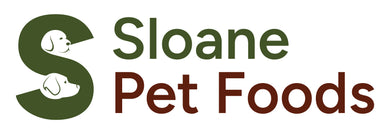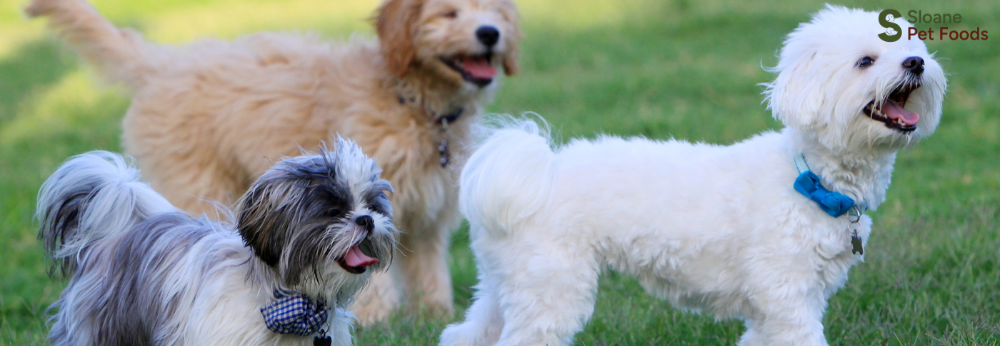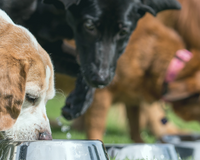Is Grain-Free Dog Food Good for Dogs?
If you’ve found yourself asking “is grain free dog food good for dogs?” — you’re not alone. With so many options available and mixed messages online, choosing the right food for your dog can feel overwhelming. At Sloane Pet Foods, we believe in offering clear, honest advice, backed by expert knowledge and thoughtfully selected ingredients. So, let’s explore what is grain free dog food, and whether it could be the right fit for your furry companion.
What Is Grain-Free Dog Food?
To start, what does grain free dog food mean? In simple terms, grain-free dog food is made without traditional cereal grains such as wheat, rice, oats, corn, or barley. Instead, it uses alternative carbohydrate sources like sweet potatoes, lentils, peas, and chickpeas. These provide energy, fibre, and nutrition — without relying on grains that may cause sensitivities in some dogs. It can come in multiple forms for dogs and for puppies, including dry and wet food - covering all your picky pooches.
Why Choose Grain-Free Dog Food?
You might be wondering, why grain free dog food? While grains can be perfectly suitable for many dogs, others may benefit from a grain-free alternative — particularly those with dietary sensitivities or ongoing discomfort.
Some common reasons for making the switch include:
-
Sensitive tummies – Some dogs experience bloating, gas, or loose stools when consuming grains. Grain-free options are often easier to digest.
-
Food intolerances – Certain dogs may react to specific grains, and eliminating them can ease digestive distress.
-
Skin conditions – A common question we hear is: does grain free dog food help with skin allergies? For many dogs, it certainly can. Grain-free diets may reduce itching, irritation, and dry or flaky skin.
-
Shinier coats and healthier skin – Natural ingredients like sweet potato and high-quality, omega-rich proteins can support coat condition and skin health.
-
Reduced allergy symptoms – Some dogs show fewer signs of environmental or food-related allergies when switched to a grain-free recipe.
In short, what is the benefit of grain free dog food? It can lead to improved digestion, fewer allergic reactions, and a generally more comfortable and energetic dog.
Is Grain-Free Dog Food Better – Or Just Different?
So, is grain free food good for dogs or is grain free dog food better for dogs? The answer depends on the individual dog. Grain-free food isn’t automatically superior — it’s a nutritional approach that’s better suited to some dogs, particularly those with sensitivities.
Dogs without allergies or intolerances may do perfectly well on regular food. However, for dogs who suffer from itchy skin, upset stomachs, or frequent ear infections, switching to grain-free may make a noticeable difference.
Put simply, is grain-free dog food good? For many dogs, yes — but it all depends on their specific needs. The goal isn’t to follow trends, but to choose what’s right for your pet.
Vet Perspectives and Common Myths
You might be asking, do vets recommend grain-free dog food? Opinions vary. Some vets may be cautious due to earlier reports linking grain-free diets to heart issues, though current research remains inconclusive. At Sloane Pet Foods, we keep up with the latest veterinary findings to ensure our meals are both balanced and safe.
Let’s address a few common myths:
-
Myth: Grain-free = low-carb
Fact: Grain-free food often includes alternative carbs like peas and lentils. It’s not necessarily low in carbohydrates. -
Myth: All dogs should be grain-free
Fact: Not every dog needs to avoid grains. Dogs are individuals — what works for one may not work for another. -
Myth: Grain-free is hypoallergenic
Fact: While some dogs benefit from grain-free diets, other ingredients may still trigger allergies. It's about reducing specific triggers.
When to Choose Grain-Free Diets
Understanding how do I know if my dog needs grain free food is key. You may want to consider switching to a grain-free recipe if your dog regularly experiences:
-
Itchy skin, rashes, or dry patches
-
Chronic ear infections
-
Excessive licking, especially of paws
-
Frequent diarrhoea, bloating, or flatulence
-
Loss of appetite or reluctance to eat
These can all be signs of food-related sensitivities. Choosing a grain-free diet may help relieve these symptoms, allowing your dog to enjoy a more settled, comfortable life.
Keep in mind, though, that grain sensitivity isn’t the only possible cause — and your vet can help rule out other conditions before making changes to your dog’s diet.
What Is the Difference Between Grain-Free Dog Food and Regular?
Let’s break it down clearly:
-
Grain-Free Dog Food
No cereal grains. Uses ingredients like sweet potato, lentils or chickpeas. May be better for dogs with sensitivities or allergy symptoms. -
Regular Dog Food
Contains grains such as rice, oats, or barley. Often suitable for dogs with no known food intolerances.
So, what is the difference between grain free dog food and regular? It’s primarily the carbohydrate source — and whether or not those ingredients suit your dog’s digestive system and skin health.
Both types of food can be complete and nutritious when made with high-quality ingredients. At Sloane Pet Foods, we’re committed to recipes that are gentle, balanced, and packed with goodness — whether grain-free or otherwise.
Final Thoughts
Still asking yourself “is grain free dog food good?” The real answer lies with your dog. For some, grain-free is life-changing — for others, it may make little difference. What matters most is choosing a food that meets your dog’s individual needs and supports their long-term wellbeing.
If you’re wondering “is grain free dog food better for dogs?” — remember, it’s not about finding the “best” food in general. It’s about finding the best food for your dog.
At Sloane Pet Foods, our grain-free recipes are thoughtfully crafted using natural ingredients and a gentle cooking process that locks in both taste and nutrition. Whether your dog needs help with sensitive skin, a dodgy tummy, or simply deserves the very best — we’re here to help them thrive.






